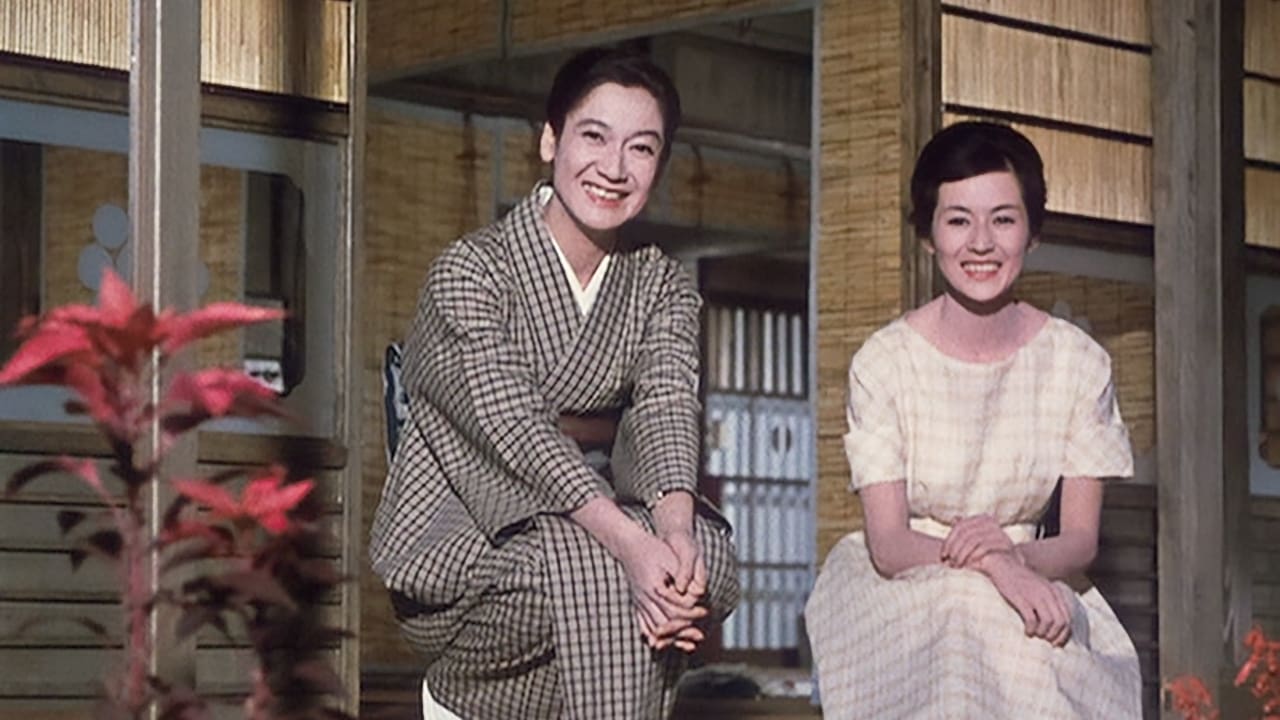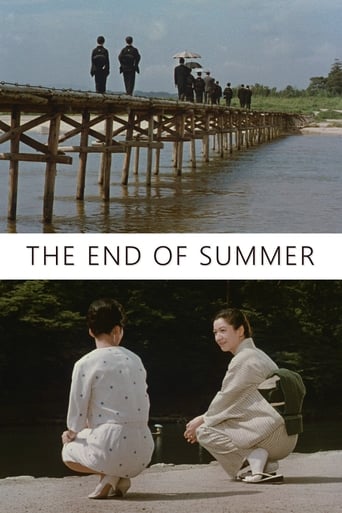



Sorry, this movie sucks
it is the rare 'crazy' movie that actually has something to say.
View MoreThis is a must-see and one of the best documentaries - and films - of this year.
View MoreThis is a coming of age storyline that you've seen in one form or another for decades. It takes a truly unique voice to make yet another one worth watching.
View MoreWestern viewers want to find a stoical impulse in Ozu's world view, but I think a certain orientalism is at play in this. Surely this "genius from the east" must be telling us something... transcendental and wise! In fact, I think the two most constant themes in Ozu's films are the momentary joys of life, and the suffering that comes with the loss of loved ones, either to death, the demands of modernity, or some conspiracy between the two. Those two topics seem stripped particularly bare in this late work, a short one by the standards of the director. Ozu's longer films, particularly Tokyo Story, might literally be chamber dramas, but in their breadth of subject and number of characters they have an epic quality- a kaleidoscopic depiction of post-war Japanese society. This film, by comparison, truly is a chamber drama with a relatively tight focus on one central figure and those around him. The characters aren't meant to comment about anything but themselves, and their joys and sorrows are laid all the more bare.
View MoreThe penultimate film in his astonishing oeuvre, Yasujiro Ozu's story about an aging widower and his relationship with his three very different daughters has a strong sense of death throughout, contradicted with some of the most gorgeous cinematography available in cinema. Ozu's typical minimalist and economical visual style are quite conducive to realizing this theme, showing how even the most beautiful and poetic elements of life eventually run their course, as does everything in this life.The main crux of the story rests on the patriarch of the family, Manbei, who continues to see a woman he knew while he was married, a notion which naturally upsets at least one of his daughters. The other two seem more pensive about the situation, leading them to contemplate their own lives as the eldest is widowed herself and debating whether or not to remarry while the youngest is wondering who she should marry. It is worth noting how Ozu portrays the elder generation as being more open to passion and vigorous living than the younger. The conclusion seems to be that despite the inevitability of death, how one lives one's life determines how they will be remembered rather than who they were perceived to be. Though death remains ever-important, it cannot and should not prevent one from attempting to live to the fullest possible existence.
View MoreThe international translation for Yasujirô Ozu's second last film is usually either Early Autumn or The End of Summer but its original title would actually be "the autumn of Kohayagawa family". Family and its changes were themes that characterized all the films by Ozu; he often portrayed the collision of different generations as well as the change of habitat and family structure. The End of Summer is a story about a family whose company has been manufacturing rice wine for generations. The head of the family is getting older, and therefore moving aside from the business, while the economic competition coerces the family to consider about joining a bigger corporation. This is one symptom of the transition. The other is being fought on a personal level, inside the family.The sisters have their contradictory aspirations and marital worries but, together with their mother, they frown upon their father who, during his later years, visits an old lover of his. During one of his trips, he gets a heart attack; summer ends, both season and generation change. At the father's funeral the visitors cross a bridge to a new era. When the smoke of the older generation rises from the pipe of the crematorium, the new generation continues leading their lives in their own ways. This beautiful poetic sequence relays an emotion of personal loss and the continuous cycle of life -- the sudden beauty and transience of life. During the funeral the true, essential values crystallize as does the inevitability of change. To this nostalgia of the old world Ozu adds a little optimism when the youngest daughter decides to go to seek a path of her own.There is something extremely interesting in the cinematography and use of static camera in the films by Ozu. He often lands the camera down, to the ground. Ground, earth and mud are important for Japanese people and, the first association which this camera work occurs, is the fact that Japanese people eat on the floor. But it's also an ideological choice; looking at the world from the perspective of a child. It's a moral approach which becomes an aesthetic fact, and it adds deep meaning and a lot of heart to this beautiful film. However, it's not just the cinematography in the visual aesthetics that captivate us but the use of colors, and the precise consideration of 'mise-en-scene'. I am on the verge of sinking to an aesthetic tumult while admiring the world of colors in The End of Summer, the exotic colors that are strange and unfamiliar to us occidentals. These kind of warm and touching films about family, Ozu made during his entire career. In addition to this particular intimate family story, the film talks more widely about cultural transition, and in its visual aesthetics Japanese tradition meets western popular culture: advertisements, neon lights and cultural behavior of the west infiltrate to the Japanese landscape. Traditional outfits turn into western clothes and the children try to attain independent solutions, on their own, without consulting their parents who they've seen as their masters for decades. Coca-cola, baseball and American soldiers tell about globalization and this vast cultural transition, which is inevitable. In the midst of depicting this harsh transition Ozu achieves to keep his heart-warming tolerance -- he never points the finger at us -- but also his bitter and intelligent irony.
View MoreThis is the second to last film of the famed Japanese director, Ozu. In many ways, it's typical of his work, such as the non-moving camera (using cuts instead of moving the stationary camera or zooming--things he never did) that is positioned slightly below the actors chests as well as the stories being about very ordinary people. Ozu loved stories where typical people dealt with transitions, aging and modern live in Japan. However, unlike most of the other films I have seen (and I've watched quite a few), the characters in THE END OF SUMMER ("Kohayagawa-ke no aki") are seemingly less noble and more difficult to like. While flawed characters are certainly NOT unusual in an Ozu film, not connecting with them is unusual--and I assume most watching the film will have a harder time making that connection with the people in the film.The film is about an older man (probably about 65 or so) who owns a small sake brewery. His wife has died several years prior and he has three daughters and a son. Two of the daughters live with him (one is a widow, the other never has married) and the issue that concerns them is marriage. The widow is rather ambivalent about a recent marriage proposal--she's content to live with her father along with her son. The other is less content but does not want to marry the man the family has picked for her.The third daughter seems really, really concerned about her father and I was unable to determine if she lived with him or not--but she sure was bothered by her father, as he's been secretly visiting his old mistress. Considering that this damaged her parents' marriage years before, it is understandable about the daughter's misgivings--though considering that the mother has been dead for some time, her worrying does seem a bit excessive. However, it's not completely unwarranted, as the mistress and particularly her daughter are very materialistic and nasty. As for the son, he's pretty much out of the picture throughout the film. You know that he works for the family business but otherwise he stays out of the intrigues.This conflict between the older man and his mistress as well as his daughters' possible marriages is an interesting situation and is rather reminiscent of the film EAT, DRINK, MAN, WOMAN---though THE END OF SUMMER is frankly much less interesting and enjoyable. In fact, that is a problem for the film. While very well made (especially the acting) and in some ways interesting, the film just plods along very, very slowly and never really grabs your attention. It certainly isn't a bad film but never seems to make the most of the interesting situation. And, the ending, seems awfully depressing--needlessly so. I know that die-hard Ozu fans won't be able to believe I only gave the film a 6 (I'd prefer to make it 6.5, but can't). It's just that compared to all the other terrific films he made, this one is a disappointment and a "lesser" film. For more satisfying Ozu, try AN AUTUMN TALE (his next film). either version of FLOATING WEEDS or LATE SPRING (my personal favorite).
View More